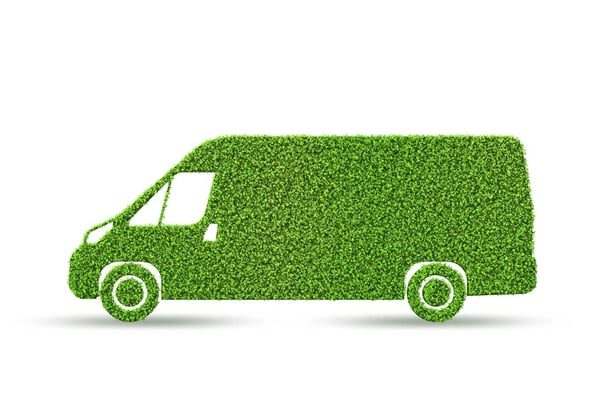An increasing number of industries are committing to climate goals, CO2 reduction and sustainability. And although these terms are often understood to mean completely different things, they all have one thing in common. When assessing the environmental impact of products and services, it is important to include the bigger picture in the overall evaluation of your supply chain.
When aiming for sustainability, businesses can't only focus on manufacturing products with environmentally friendly raw materials but also take into account the carbon footprint of the transportation and delivery of goods. Clever alternatives are now playing an important role, especially as e-commerce grows.
What is climate-neutral shipping?
Climate-neutral shipping refers to all shipping methods where absolutely no climate-damaging carbon dioxide (CO2) is produced. For example, when bike couriers deliver pizza or when the CO2 emissions produced during shipping are specifically compensated for or offset. The definition of “climate-neutral” focuses on the greenhouse gas CO2, even though shipping processes can produce other climate-relevant gases like nitrogen or carbon monoxide, especially when combustion engines are used.

The focus on CO2 for climate-neutral shipping since the 2000s has generally proved to be effective, and there is a practical reason for this: it is particularly easy to calculate the amount of CO2 emissions for products and services. CO2 emissions (measured in grams, kilograms, or tons of CO2 per unit of the product) have become the common currency used in the last 20 years to understand and assess how good or bad something is from a climate perspective.
In established climate-neutral shipping, carbon emissions can be remedied accurately and precisely based on the supply chain and route taken by the products. Businesses support environmental projects or climate-friendly measures to offset this carbon footprint that mathematically compensate for the CO2 produced to create a healthy balance.
How can shippers offset CO2?
Many online shops play a key role in offsetting CO2. To be considered climate-neutral, a product or service (e.g. parcel delivery) must not cause any greenhouse gases. As complete prevention of CO2 is almost impossible in practice due to the distances that a product has to travel, the emissions have to be offset retrospectively.
One option for providers of goods or services is to offset the CO2 voluntarily by directly planting trees or getting involved in reforestation projects. They can then provide evidence to show that they are operating in a climate-neutral way overall. However, as not every provider can afford to plant a forest or trees, indirectly supporting environmental projects is another option. This can be done by making regular contributions or donations and doesn't have to be local; it can also be carried out in other countries, as climate neutrality is based on a global CO2 calculation.
The last mile: a chance for sustainable action
When considering carbon emissions along the supply chain, we can see that the crux of the issue remains on the so-called “last mile”, the final stretch before a product reaches the end consumer. And the growth of online retailing is making this last mile even more significant. Even before the online boom caused by coronavirus, last mile deliveries were causing high carbon emissions.
The forecast until 2030::
●In the next nine years, the number of deliveries by vehicle in the top 100 cities in the world will increase by 36%.
●Stricter regulation of electric vehicles in inner cities, optimized follow-up deliveries and effective data-based connectivity solutions, such as dynamic route planning, load-pooling solutions and the expansion of parcel stations will improve sustainability.
●This will, in turn, reduce CO2 emissions by 30%, with traffic congestion also decreasing by 30% and delivery costs by 25%.
Experts recommend clear regulations and laws for autonomous driving, the introduction of sustainable supply chain technologies and, last but not least, the use of data and advanced analytics for better real-time transport taxes, all of which could make the last mile more sustainable.
7SGreen – a climate-neutral delivery option
Martijn Kleij expert in e-commerce, supply chain logistics, and delivery at Seven Senders shares: “Sustainability and sustainable delivery is increasingly playing a role in consumer’s purchasing decisions. Reducing or offsetting carbon emissions in the shipping process is something we at Seven Senders have factored into our business model. As Europe’s leading delivery platform, we want to be part of the solution and are working to the best of our abilities toward becoming climate-neutral and helping our customers meet their climate goals as well with our 7S Green product.”
Find out more about our carbon-neutral shipping option by visiting our 7SGreen page and downloading the factsheet!
